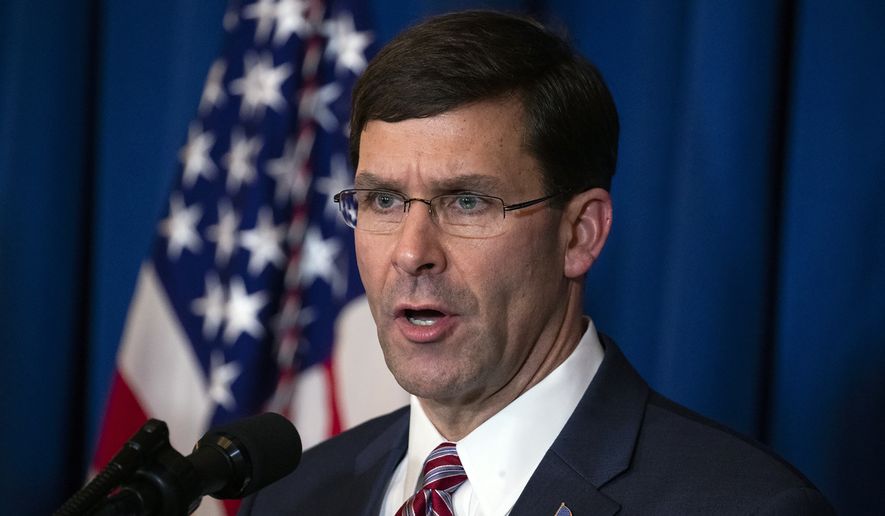Military officials in Tehran were behind the attack on the U.S Embassy in Baghdad and are likely planning other actions through their proxies against American interests in the region, Secretary of Defense Mark Esper told reporters at the Pentagon Thursday.
Tuesday’s attack was carried out by Shiite militia fighters under the direction of the Iran Revolutionary Guard Corps, officials said, in response to U.S. airstrikes last week on a militia base near the Iraq-Syria border.
“We know it was Iranian-backed Shia militias because key leaders were spotted in the crowd and some militia members showed up wearing their uniforms and carried the flags of the militia, including KH,” Mr. Esper said, referring to the Iraqi Shiite militia Kata’ib Hizbollah.
Iran-backed militias have carried out nearly 12 attacks against U.S. forces in the past two months alone, U.S. officials say, and there are indications Tehran might be planning additional attacks. The U.S. has about 5,000 troops stationed in Iraq as part of the coalition to roll back Islamic State, but their presence in the country has become a flashpoint for both Iran and its allies inside Iraq.
“We know there’s a sustained campaign. We know the campaign has increased in tempo and intensity,” Mr. Esper said. “We’ve seen Iranian-sponsored members of the same militia and others protesting, taking violent actions against our embassy.”
Pentagon officials have already dispatched about 100 Marines, along with 750 Army paratroopers from the 82nd Airborne Division, to reinforce the facilities under U.S. control and protect U.S. personnel as needed throughout the region.
“It’s a rapid-reaction force for exactly these types of situations. Their purpose is defensive in nature,” said Gen. Mark Milley, Chairman of the Joint Chiefs of Staff.
The ability to pack up and move on a short notice was one of the reasons the 82nd Airborne was picked for the mission. Mr. Esper said the U.S. military must learn to be more flexible in the future.
“We have to be able to quickly deploy forces, use them as we need them, and then redeploy them,” Mr. Esper said. “We have to get much more nimble, operationally. This is a good opportunity to do that.”
Pentagon officials said other forces could also be sent to the region at a later date.
Gen. Milley threw down the gauntlet to the Iran proxy fighters who attacked the periphery of the U.S. embassy in Baghdad. He said the diplomatic compound, about 180 acres in the heart of the capital’s fortified Green Zone, is secure and completely safe.
“There is sufficient combat power there. Anyone who attempts to outrun that will run into a buzzsaw,” Gen. Milley said.
The U.S. military may not wait to be attacked before taking decisive action, officials said.
“If we get word of an attack or if there’s some indication, we will take preemptive actions as well,” Mr. Esper said. “The game has changed.”
Pentagon officials say it’s ultimately up to Iraqi leaders to reduce Iran’s influence in their country.
“They have the capability. It’s just a question of will,” Gen. Milley said.
• Mike Glenn can be reached at mglenn@washingtontimes.com.




Please read our comment policy before commenting.